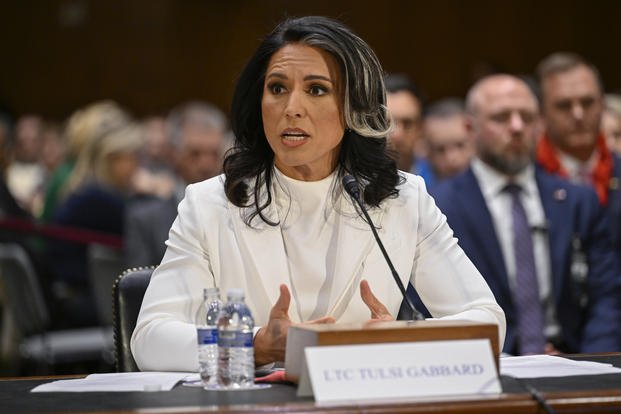Tulsi Gabbard’s Path to Intelligence Chief Faces Senate Challenge
The nomination of Tulsi Gabbard as President Donald Trump’s director of national intelligence is stirring debate in Washington. Her nomination proceeded past a significant hurdle on Tuesday, advancing through the Senate Intelligence Committee despite contentious discussions surrounding her previous statements and meetings.
Gabbard, a former Democratic congresswoman, is known for her polarizing reputation. Lawmakers from both major parties have expressed concerns over her past sympathies towards Russia and her association with Edward Snowden, the notorious government leaker. However, her nomination advanced with a narrow 9-8 vote in the Senate Intelligence Committee, with Democrats uniformly opposing.
The full Senate is now set to consider Gabbard’s nomination, although a voting date remains unconfirmed. After a heated confirmation hearing last week, where she faced severe scrutiny from some Republican senators, Gabbard gained necessary GOP support due to a weekend campaign by Trump supporters, notably Elon Musk.
Initially, it was uncertain whether Gabbard’s nomination would progress beyond the Intelligence Committee, especially as three crucial Republican senators had not declared their positions. With strong Democratic resistance and a slim GOP majority, Gabbard will require near-unanimous Republican backing for confirmation.
Despite some Republicans questioning her historical viewpoints, they are aligned with Gabbard on the need for reform within the Office of the Director of National Intelligence. This office oversees numerous federal agencies tasked with intelligence operations, which some GOP members argue has become too expansive and politically influenced.
Senate Intelligence Chairman Tom Cotton expressed his willingness to collaborate with Gabbard, highlighting the necessity for changes in the ODNI. Cotton remarked, “bring badly needed reforms” to the intelligence office.
Although Gabbard has military experience as a lieutenant colonel in the National Guard with deployments to the Middle East, she lacks formal experience in intelligence or agency leadership. Her past comments about Snowden, who sought asylum in Russia after exposing classified data, became a focal point during her hearing. Gabbard acknowledged Snowden’s legal violations, stating, “Edward Snowden broke the law,” while also recognizing the value of the information he revealed.
Gabbard’s 2017 meeting with Syrian President Bashar Assad has also drawn criticism. Following Assad’s recent ousting after a violent civil war where he faced chemical weapons accusations, Gabbard faced backlash for seemingly endorsing a dictator. Despite this, she maintained her stance, asserting that her visit was intended to address Assad’s human rights abuses.
Her previous statements aligning with Russian narratives concerning Ukraine and her opposition to significant U.S. surveillance legislations have not alleviated Democratic apprehensions. Senator Mark Kelly of Arizona articulated his reservations, questioning Gabbard’s suitability for a critical national security role.
In a notable display of influence, the pro-Trump faction, including Musk, swayed GOP senators to support Gabbard. Musk’s criticism of Republican Senator Todd Young of Indiana, labeling him a “deep-state puppet,” was later retracted after Young declared his newfound support. Young clarified that his stringent questioning was a part of his duty, stating, “I have done what the framers envisioned for senators to do.”
© Copyright 2025 Associated Press. All rights reserved. This material may not be published, broadcast, rewritten or redistributed.









